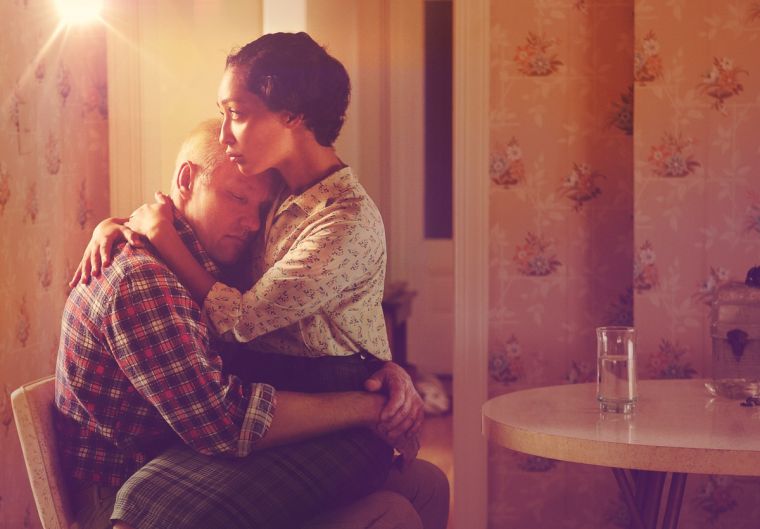The Powerful Film 'Loving' Has Important Challenges For All Who Seek To Follow Christ

Inter-racial marriage has only been legal across America for 50 years. It's a staggering fact, especially to the ear of generations born since the 1967 Supreme Court ruling which finally enabled men and women to marry regardless of their colour or which state they happened to live in. To put that in context, that law is younger than TV series Doctor Who, and was ruled a couple of weeks after the release of The Beatles' Sergeant Pepper album. The law change is shockingly recent.
Jeff Nichols' film Loving, out this week, tells the story behind that historic Supreme Court decision, and of the couple at the centre of the case which provoked it. Richard and Mildred Loving were an interracial couple living in small-town Virginia, who had to leave their state in order to find a courthouse which would marry them. The problem was that when they returned to their home and family, their marriage effectively became illegal, and the child in Mildred's womb officially termed a "bastard". Once their marriage was discovered by local police, they were forced to begin nine-year battle with the laws of their state, and eventually the US Constitution itself in order to have their marriage and children legally recognised.
The film's gentle opening lulls you into a false sense of security and even equality. Nichols depicts Richard Loving (Joel Edgerton) as a humble and hardworking man, fully accepted by Mildred's (Ruth Negga) family, and seemingly oblivious to the colour of his many black friends. They are apparently simple, happy folk, aspiring only to marry, raise children and to have bricklayer Richard build a home of their own. This tranquility is shattered however when the archaic laws of Virginia are revealed and gleefully enacted by local Sheriff (Marton Csokas), who tears the couple from their bed while they sleep, and initiates their long journey through police cells and lawyer's offices.
It's not a punch-the-air courtroom drama, or even a painful thriller about the threat of racial violence. Instead it's a subtle, tender portrait of two people very much in love, and told by bad laws that they should not be. Nichols takes his time to build up a picture of their relationship, and uses that to build the Lovings' case, rather than focusing on the blunt ugliness of racism itself. As a result it'll be too slow-paced for some, but filmgoers who appreciate gentle, artistic storytelling will be hooked throughout.
Negga's performance has rightly acclaimed to the point of Oscar nomination, but Edgerton's understated, physical portrayal of Richard should not be overlooked. Both show their characters as simple, uneducated people who are constantly confused by the injustice of what's going on around them, and this is where the film is perhaps at its most nuanced and interesting. A story about civil rights might immediately be written off as a liberal tract, but actually the message of the film is surprisingly conservative: that less educated people rely on the intellectual elite – the activists, law-makers and politicians – to fight for their rights, and to make wise decisions on their behalf. The Lovings were a case which proved a huge error in the law, but they were unable to fight it alone. That message has a wide application even today, and speaks of the responsibility that those of us with the power to bring change bear towards those who do not.
Loving has been coincidentally released alongside Hidden Figures, a movie about black female trailblazers in the NASA space programme, and another illumination of how racial prejudice was allowed to fester unchecked in American institutions for far too long. Both stories make you wonder how on earth the so-called civilised world was ever like this, let alone in such recent history. And yet both films seem painfully timely. In America today the laws might have changed, but the air of racial difference and prejudice remains, even after the appointment of a Black President. The same insidious attitudes portrayed in Loving are sadly still alive and festering today.
In Nichols' film, racism isn't presented as the angry, violent pursuit of prejudiced individuals, but as a seemingly immovable object, practiced by whole institutions and enshrined in law. Today the reverse seems true, and the Lovings' story should provoke us to see that change. Again, those with the power to enact change bear a great responsibility to those who been historically rendered far less powerful.
Despite the church's well-documented role in the American civil right's movement, God is only mentioned as the supposed original architect of racial segregation, and his followers are nowhere to be seen. Yet despite leaving them out of the picture, I think Nichols' film has some important challenges for people who seek to live the Way of Christ. While religion was originally used as a justification for racist laws and attitudes, Jesus sought to establish a kingdom of equality and love. In the film, that Kingdom feels much more present in the Lovings' home and marriage than in the court-rooms which try to dehumanise them. In 2017, just fifty years after that historic and long-overdue ruling, the American church must ensure they're still part of ushering that Kingdom in, rather than allowing it to be undermined on their watch.
Martin Saunders is a Contributing Editor for Christian Today and the Deputy CEO of Youthscape. Follow him on Twitter @martinsaunders.











